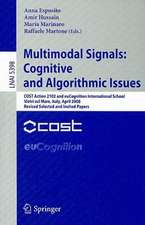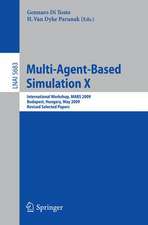Quantifying and Processing Biomedical and Behavioral Signals: Smart Innovation, Systems and Technologies, cartea 103
Editat de Anna Esposito, Marcos Faundez-Zanuy, Francesco Carlo Morabito, Eros Paseroen Limba Engleză Hardback – 27 aug 2018
- identify new methods for data processing and data flow coordination through synchronization, and optimization of new encoding features combining contextually enacted communicative signals, and
- develop shared digital data repositories and annotation standards for benchmarking the algorithmic feasibility and successive implementation of believable human–computer interaction (HCI) systems.
a. the research community, PhD students, early stage researchers
c. schools, hospitals, and rehabilitation and assisted-living centers
e. the ICT market, and representatives from multimedia industries
| Toate formatele și edițiile | Preț | Express |
|---|---|---|
| Paperback (1) | 601.31 lei 3-5 săpt. | +19.44 lei 7-13 zile |
| Springer International Publishing – 20 dec 2018 | 601.31 lei 3-5 săpt. | +19.44 lei 7-13 zile |
| Hardback (1) | 646.63 lei 6-8 săpt. | |
| Springer International Publishing – 27 aug 2018 | 646.63 lei 6-8 săpt. |
Din seria Smart Innovation, Systems and Technologies
- 18%
 Preț: 1103.77 lei
Preț: 1103.77 lei - 18%
 Preț: 1847.51 lei
Preț: 1847.51 lei - 20%
 Preț: 755.04 lei
Preț: 755.04 lei - 18%
 Preț: 1889.78 lei
Preț: 1889.78 lei - 18%
 Preț: 1227.86 lei
Preț: 1227.86 lei - 20%
 Preț: 1708.96 lei
Preț: 1708.96 lei - 20%
 Preț: 1278.28 lei
Preț: 1278.28 lei - 20%
 Preț: 1736.82 lei
Preț: 1736.82 lei - 20%
 Preț: 2205.21 lei
Preț: 2205.21 lei - 18%
 Preț: 2501.60 lei
Preț: 2501.60 lei - 20%
 Preț: 1327.40 lei
Preț: 1327.40 lei - 18%
 Preț: 1545.90 lei
Preț: 1545.90 lei - 18%
 Preț: 1115.07 lei
Preț: 1115.07 lei - 18%
 Preț: 1382.79 lei
Preț: 1382.79 lei - 20%
 Preț: 1725.71 lei
Preț: 1725.71 lei - 20%
 Preț: 2188.81 lei
Preț: 2188.81 lei - 18%
 Preț: 1217.04 lei
Preț: 1217.04 lei - 20%
 Preț: 1290.56 lei
Preț: 1290.56 lei - 20%
 Preț: 931.83 lei
Preț: 931.83 lei - 20%
 Preț: 1919.42 lei
Preț: 1919.42 lei - 20%
 Preț: 1778.78 lei
Preț: 1778.78 lei - 18%
 Preț: 1109.73 lei
Preț: 1109.73 lei - 20%
 Preț: 1746.63 lei
Preț: 1746.63 lei - 18%
 Preț: 945.06 lei
Preț: 945.06 lei - 20%
 Preț: 1749.92 lei
Preț: 1749.92 lei - 18%
 Preț: 1372.79 lei
Preț: 1372.79 lei - 20%
 Preț: 1907.98 lei
Preț: 1907.98 lei - 20%
 Preț: 1611.54 lei
Preț: 1611.54 lei - 20%
 Preț: 1611.54 lei
Preț: 1611.54 lei - 20%
 Preț: 2193.72 lei
Preț: 2193.72 lei - 20%
 Preț: 1606.63 lei
Preț: 1606.63 lei - 20%
 Preț: 1302.82 lei
Preț: 1302.82 lei - 20%
 Preț: 1301.19 lei
Preț: 1301.19 lei - 20%
 Preț: 1740.10 lei
Preț: 1740.10 lei - 20%
 Preț: 1446.11 lei
Preț: 1446.11 lei - 20%
 Preț: 1453.52 lei
Preț: 1453.52 lei - 20%
 Preț: 1615.62 lei
Preț: 1615.62 lei - 20%
 Preț: 1452.68 lei
Preț: 1452.68 lei - 20%
 Preț: 1909.60 lei
Preț: 1909.60 lei -
 Preț: 433.17 lei
Preț: 433.17 lei - 15%
 Preț: 636.99 lei
Preț: 636.99 lei - 18%
 Preț: 1403.31 lei
Preț: 1403.31 lei - 20%
 Preț: 1913.69 lei
Preț: 1913.69 lei - 20%
 Preț: 1743.38 lei
Preț: 1743.38 lei - 20%
 Preț: 1743.38 lei
Preț: 1743.38 lei - 20%
 Preț: 1727.00 lei
Preț: 1727.00 lei - 18%
 Preț: 1116.60 lei
Preț: 1116.60 lei - 20%
 Preț: 1607.46 lei
Preț: 1607.46 lei
Preț: 646.63 lei
Preț vechi: 808.29 lei
-20% Nou
Puncte Express: 970
Preț estimativ în valută:
123.84€ • 127.59$ • 103.74£
123.84€ • 127.59$ • 103.74£
Carte tipărită la comandă
Livrare economică 22 februarie-08 martie
Preluare comenzi: 021 569.72.76
Specificații
ISBN-13: 9783319950945
ISBN-10: 3319950940
Pagini: 258
Ilustrații: XI, 274 p. 83 illus., 65 illus. in color.
Dimensiuni: 155 x 235 mm
Greutate: 0.58 kg
Ediția:1st ed. 2019
Editura: Springer International Publishing
Colecția Springer
Seria Smart Innovation, Systems and Technologies
Locul publicării:Cham, Switzerland
ISBN-10: 3319950940
Pagini: 258
Ilustrații: XI, 274 p. 83 illus., 65 illus. in color.
Dimensiuni: 155 x 235 mm
Greutate: 0.58 kg
Ediția:1st ed. 2019
Editura: Springer International Publishing
Colecția Springer
Seria Smart Innovation, Systems and Technologies
Locul publicării:Cham, Switzerland
Cuprins
A Human-Centered Behavioral Informatics.- Wearable Devices for Self-Enhancement and Improvement of Plasticity: Effects on Neurocognitive Efficiency.- Age and Culture Effects on The Ability to Decode Affective Bursts.- N200 ERP Component in Olfactory and Haptic Crossmodal Perception.- Handwriting and Drawing Features for Detecting Negative Moods.- Oressinergic System: Network Between Sympathetic System and Exercise.- Experimental Analysis of In-Air Trajectories at Long Distances in Online Handwriting.- Kendon Model-Based Gesture Recognition Using Hidden Markov Model and Learning Vector Quantization.- A Neural Network to Identify Driving Habits and Compute Car-Sharing Users' Reputation.- Unsupervised Gene Identification in Colorectal Cancer.- Supervised Gene Identification In Colorectal Cancer.- Intelligent Quality Assessment of Geometrical Features for 3D Face Recognition.- A Novel Deep Learning Approach in Hematology for Classification of Leucocytes.
Textul de pe ultima copertă
The book is based on interdisciplinary research on various aspects and dynamics of human multimodal signal exchanges. It discusses realistic application scenarios where human interaction is the focus, in order to
a. the research community, PhD students, early stage researchers
c. schools, hospitals, and rehabilitation and assisted-living centers
e. the ICT market, and representatives from multimedia industries
- identify new methods for data processing and data flow coordination through synchronization, and optimization of new encoding features combining contextually enacted communicative signals, and
- develop shared digital data repositories and annotation standards for benchmarking the algorithmic feasibility and successive implementation of believable human–computer interaction (HCI) systems.
a. the research community, PhD students, early stage researchers
c. schools, hospitals, and rehabilitation and assisted-living centers
e. the ICT market, and representatives from multimedia industries
Caracteristici
Covers various scientific areas in machine learning, artificial neural networks, social and biometric data for applications in human–computer interactions Presents recent research in dynamic signal exchanges and demonstrates how these advances can characterize a more friendly human–machine interaction Proposes approaches to measure and quantify human behavior for the implementation of autonomous, and complex human–computer Interfaces Considers key aspects of the integration of algorithms and procedures for the recognition of dynamic (faces, speech, gaits, EEGs, brain and speech waves) signals, in anticipation of the implementation of useful applications such as intelligent avatars, interactive dialog systems, and reliable complex autonomous systems for human signal’s detection and identification Includes contributions from leading authorities in their respective fields


























